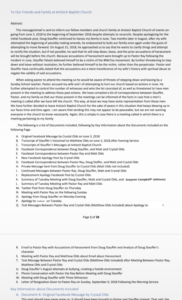**Names marked with an asterisk (*) have been changed for the privacy of individuals and their families**
As we prepared to leave Antioch Baptist Church in early September 2018, I began to assemble a document describing the events that transpired from June 2018 to September 2018 that eventually led up to our departure. This document included, but was not limited to, transcripts of Douglas Stauffer’s voicemail, private Facebook messages between Pastor Andrew Ray, Douglas Stauffer, Matthew Olds, and myself, as well as copies of the email sent to our pastor about the harassment, and summaries of the meetings that took place.
My husband, simply desiring peace, was not supportive of the idea, but Pastor Andrew Ray’s words continued to repeat in my head about how we were not supposed to know that about the letter to the Crawfords*. The church’s letter not only dismissed the Crawfords* from church membership and the Antioch Baptist Bible Institute, but even callously threatened to contact their oldest daughter’s religious educational establishment should their family not leave in a way acceptable to the ones behind the letter! I find it ironic that Pastor Andrew Ray and Douglas Stauffer repeatedly attempted to invalidate my concerns by claiming them as merely transference from my past, and yet, Pastor Andrew Ray stooped as low as my mentor’s husband (Randy) to threaten a teenager’s college education as a means of silencing and control!
Both agreeing that such actions were not only appalling but manipulative, my husband I finally compromised by deciding to limit the recipients of the document we had created to just the few witnesses present at the final meeting with Douglas Stauffer. My husband desired to not cause division or strife, but I had felt strongly that our church needed to know the truth.
A copy of the abstract and list of documents sent to the witnesses is provided below:

To Our Friends and Family at Antioch Baptist Church
Abstract:
This message/email is sent to inform our fellow members and church family at Antioch Baptist Church of events on-going from June 3, 2018 to the beginning of September 2018 despite attempts to reconcile. Despite apologizing for the initial Facebook post, Doug Stauffer continued to harass my family in June. Two months later in August, after my wife attempted the beginning of possibly making amends, he endeavored to bully our family once again under the guise of attempting to move forward. On August 22, 2018, he approached us to say that he wants to clarify things and attempt to rectify the situation, but if not possible, he said that he will step down, leave, and the prior accusations of harassment will be brought before the church. Because accusations of harassment were brought up to Pastor Ray following the incident in June, Stauffer falsely believed himself to be a victim of the #MeToo movement. By further threatening to step down and leave without resolution, he further believed himself to be the victim, rather than the perpetrator. Pastor and Stauffer have continually stated that the accusations are a mere transference of my wife’s history with spiritual abuse to negate the validity of said accusations.
When asking pastor to attend the meeting so he would be aware of threats of stepping down and leaving by a Sunday School teacher, Pastor accused my wife and I of attempting to hurt our church based on actions in June. He further attempted to control the number of witnesses and who the list consisted of, as well as threatened to have men present in the meeting to address these past actions. We have compiled a list of correspondence between Stauffer, Pastor, and my family so that our those present in the meetings can be informed of the facts in case that a men’s meeting is called after we have left the church. This way, at least we may have some representation from those men. We have further decided to leave Antioch Baptist Church for the sake of peace in this situation that keeps blowing up in our faces time and time again. I am aware that sending this may not appear to be peaceable, but we are not wanting everyone in the church to know necessarily. Again, this is simply in case there is a meeting called in which there is a meeting pertaining to my family.
The following is a list of Documents included, [followed] by Key Information about the Documents Included on the following Page:
A. Original Facebook Message by Crystal Olds on June 3, 2018
B. Transcript of Stauffer’s Voicemail to Matthew Olds on June 3, 2018 after Evening Service
C. Transcripts of Stauffer’s Messages at Antioch Baptist Church
D. Facebook Correspondence between Doug Stauffer, and Matt and Crystal Olds
E. Facebook Correspondence between Pastor Ray and Matt Olds
F. New Facebook Apology Post by Crystal Olds
G. Facebook Correspondence between Pastor Ray, Doug Staffer, and Matt and Crystal Olds
H. Private Message Sent from Doug Stauffer to Crystal Olds (Matt Olds not included)
I. Continued Messages between Pastor Ray, Doug Stauffer, Matt and Crystal Olds
J. Replacement Apology Facebook Post by Crystal Olds
K. Summary of Tuesday Meeting with Doug Stauffer, Matt and Crystal Olds, and Grayson Campbell* (witness)
L. Summary of Tuesday Meeting with Pastor Ray and Matt Olds
M. Twitter Post from Doug Stauffer on Thursday
N. Meeting with Pastor Ray on the following Sunday
O. Apology from Doug Stauffer on Monday Evening
P. Apology to Crawfords* on Tuesday
Q. Text Messages Between Pastor Ray and Crystal Olds (Matthew Olds Included) about Apology to Mary*
R. Email to Pastor Ray with Accusations of Harassment from Doug Stauffer and Analysis of Doug Stauffer’s character
S. Meeting with Pastor Ray and Matthew Olds about Email about Harassment
T. Text Message Between Pastor Ray and Crystal Olds (Matthew Olds Included) after Meeting Between Pastor Ray, Matthew Olds and Crystal Olds
U. Doug Stauffer’s August attempts at bullying, creating a hostile environment
V. Phone Conversation with Pastor the Day Before Meeting with Doug Stauffer
W. Meeting with Doug Stauffer with Three Witnesses
X. Letter of Resignation Given to Pastor Ray on Sunday, September 9, 2018 Following the Morning Service
In this series I share my thoughts and opinions concerning these ministers and the events which led to my departure. Click here to continue reading: “Blindsided: Finally Speaking Out” or click on the link below.
For a list of the complete series, click here.
********
Shop at our Amazon store! As an Amazon Influencer, this website earns from qualifying purchases.



 I’ve written this hoping it will help those who have left an unhealthy church and have not yet found a new one or those who cannot even attempt to look. These ministers can yell it at the top of their lungs all they want, but God is not going to cast you aside if you are not attending a church. Your relationship with God is not now, and never will be, dependent upon meeting with others in a church building.
I’ve written this hoping it will help those who have left an unhealthy church and have not yet found a new one or those who cannot even attempt to look. These ministers can yell it at the top of their lungs all they want, but God is not going to cast you aside if you are not attending a church. Your relationship with God is not now, and never will be, dependent upon meeting with others in a church building.


 Another area of difficulty can be your concentration. You may find your mind wandering off in a service and also when you try to read. This is also very normal. Should you find yourself not listening to what is being taught or unable to focus on reading something from the Bible (as well as other books), understand that this happens. At the same time, when it comes to the service, check yourself to see if it is an overall difficulty with concentrating or if the minister isn’t providing anything edifying and that is what is causing your inattention.
Another area of difficulty can be your concentration. You may find your mind wandering off in a service and also when you try to read. This is also very normal. Should you find yourself not listening to what is being taught or unable to focus on reading something from the Bible (as well as other books), understand that this happens. At the same time, when it comes to the service, check yourself to see if it is an overall difficulty with concentrating or if the minister isn’t providing anything edifying and that is what is causing your inattention.